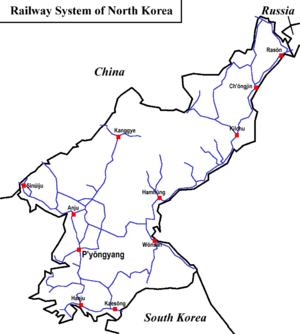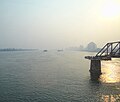Rail transport in North Korea

Rail transport in North Korea is provided by Korean State Railway (조선 민주주의 인민 공화국 철도성, Chosŏn Minjujuŭi Inmin Konghwaguk Ch'ŏldosŏng) which is the only rail operator in North Korea. It has a network of over 6,000 km of track, of which the vast majority is standard gauge; there is, however, nearly 400 km of narrow-gauge lines (762 mm) in various locations around the country.[1]
Contents
1 Routes
2 Stations
3 Pyongyang Metro
4 International services
4.1 China
4.2 Russia
4.3 South Korea
5 Rolling stock
6 Presidential trains
7 Future plans
8 Gallery
9 History
10 See also
11 References
Routes
In many cases, the name of the line is a combination of the names of the original termini. This is analogous to the Bakerloo line (Baker Street to Waterloo) in England. However, because of the division of Korea, some lines now terminate short of their original destinations. The following lists the main standard-gauge trunk lines:
Hambuk Line: Ch'ŏngjin Ch'ŏngnyŏn - Rajin, 331.1 km, 1,435 mm (4 ft 8 1⁄2 in)
Kangwŏn Line: Kowŏn - P'yŏnggang, 145.8 km, 1,435 mm
Manp'o Line: Sunch'ŏn - Manp'o, 299.9 km, 1,435 mm
Paektusan Ch'ŏngnyŏn Line: Kilchu Ch'ŏngnyŏn - Hyesan Ch'ŏngnyŏn, 141.7 km, 1,435 mm
P'yŏngbu Line: P'yŏngyang - Kaesŏng (-> Dorasan, ROK), 187.3 km, 1,435 mm
P'yŏngdŏk Line: P'yŏngyang - Kusang Ch'ŏngnyŏn, 192.3 km, 1,435 mm
P'yŏngnam Line: P'yŏngyang - Namp'o, 55.2 km, 1,435 mm
P'yŏngra Line: P'yŏngyang - Rajin (and on to Khasan, Russia), 819.0 km, 1,435 mm
P'yŏngŭi Line: P'yŏngyang - Sinŭiju (and on to Dandong, China), 225.1 km, 1,435 mm
Stations
Pyongyang Metro
The Pyongyang Metro operates the only known underground mass transit in North Korea. Metro services are also supplemented with above-ground tram services in both Pyongyang and a number of secondary cities.
International services

North Korean 다침30-type coach on K27/28 Beijing-Pyongyang train; Based on China Railways 25G coaches, these coaches were built in China.
China
The primary rail gateway to North Korea is via the Sino-Korea Friendship Bridge from Dandong, China to Sinuiju, North Korea. Passenger trains are taken as far as Dandong by the China Railway at which point the domestic Chinese carriages are uncoupled and North Korean carriages and locomotive are attached. There are several other active border crossings with China, including at Manp'o and Namyang
Russia
Rajin has a rail link to the Russian Railways system over a bridge across the Tumen River in the North Korea–Russia border. There is transborder passenger service from Pyongyang to Moscow, with a Korean rail car taken across the border (with bogies changed to the Russian gauge), and eventually attached to a Vladivostok-Moscow train.[2][3]
Since 2013 the line over the Tumen River to Rajin is rebuilt with dual gauge track, so that standard gauge and Russian broad gauge trains from the Russian Khasan can access the port of Rajin. Railway and port are operated in a joint venture with the Russian RasonKonTrans.[4]
South Korea
In 2000, a freight service was inaugurated, between South Korea and the industrial park at Kaesong; however, usage has been very low and most trains carry no freight.[5]
Plans for a north-south rail link were blocked by the US military in September 2018.[6]
Rolling stock
Presidential trains
The nation's former leader Kim Jong-il had a chronic fear of flying,[7] and was known to use the country's railway network extensively, travelling to his palaces and for out-of-town appointments in one of his presidential trains, as did his father Kim Il-sung. Both Kims took their trains on trips abroad as well.[8][9]
Future plans
A Trans-Korean Main Line is planned, spanning North Korea and allowing South Korean rail freight access to Russian Railways.[10]
Gallery
Locomotive in North Korea
Pyongyang Metro

Crossing into North Korea on the Sino-Korea Friendship Bridge

Sino-Korea Friendship Bridge

Railway electrification

Maintenance works

Sinanju station building
Pyongyang station at night
History
Much of the rail network in Korea was built during the period of Japanese rule, which ended in 1945. There were 2,792 km (1,735 mi) of railway in 1925.[11] Much was damaged or destroyed during the Korean War.
See also
- Rail transport in South Korea
- Transport in North Korea
References
^ Hayato, Kokubu, 将軍様の鉄道 (Shōgun-sama no Tetsudō), .mw-parser-output cite.citation{font-style:inherit}.mw-parser-output q{quotes:"""""""'""'"}.mw-parser-output code.cs1-code{color:inherit;background:inherit;border:inherit;padding:inherit}.mw-parser-output .cs1-lock-free a{background:url("//upload.wikimedia.org/wikipedia/commons/thumb/6/65/Lock-green.svg/9px-Lock-green.svg.png")no-repeat;background-position:right .1em center}.mw-parser-output .cs1-lock-limited a,.mw-parser-output .cs1-lock-registration a{background:url("//upload.wikimedia.org/wikipedia/commons/thumb/d/d6/Lock-gray-alt-2.svg/9px-Lock-gray-alt-2.svg.png")no-repeat;background-position:right .1em center}.mw-parser-output .cs1-lock-subscription a{background:url("//upload.wikimedia.org/wikipedia/commons/thumb/a/aa/Lock-red-alt-2.svg/9px-Lock-red-alt-2.svg.png")no-repeat;background-position:right .1em center}.mw-parser-output .cs1-subscription,.mw-parser-output .cs1-registration{color:#555}.mw-parser-output .cs1-subscription span,.mw-parser-output .cs1-registration span{border-bottom:1px dotted;cursor:help}.mw-parser-output .cs1-hidden-error{display:none;font-size:100%}.mw-parser-output .cs1-visible-error{font-size:100%}.mw-parser-output .cs1-subscription,.mw-parser-output .cs1-registration,.mw-parser-output .cs1-format{font-size:95%}.mw-parser-output .cs1-kern-left,.mw-parser-output .cs1-kern-wl-left{padding-left:0.2em}.mw-parser-output .cs1-kern-right,.mw-parser-output .cs1-kern-wl-right{padding-right:0.2em}
ISBN 978-4-10-303731-6
^ The forbidden railway: Vienna - Pyongyang 윈 - 모스크바 - 두만강 - 평양. Our train trip via Russia to North Korea - using an officially closed for foreigners route inside the "Hermit Kingdom"
^ Boarding the direct train to Pyongyang, 2008-09-15
^ North Korean Rail Link completed, Railway Gazette International, viewed on 1 October 2013
^ Spencer, Richard (2010-10-30). "Korean detente railway becomes ghost train - Telegraph". The Daily Telegraph. London. Retrieved 2010-10-30.
^ https://www.rt.com/news/437385-south-north-korea-rail-us/
^ "Kim Jong-il's Russian odyssey". BBC. 6 August 2001.
^ "Profile: Kim Jong-il", BBC News, 31 July 2003.
^ Fear of flying forces Kim Jong Il to use fleet of private trains Times Online, November 10, 2009.
^ "Trans-Korean Main Line – Investment in the Future – Russian Transport Daily Report". 2010-10-29. Archived from the original on 2011-02-27. Retrieved 2010-10-30.
^ Everyman's Encyclopaedia, 1931, volume 8, pp 217-218







